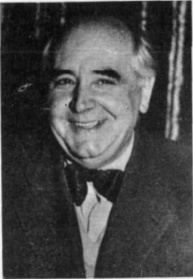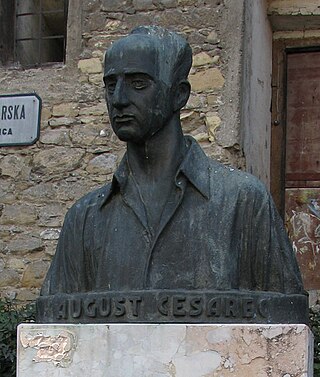
Miroslav Krleža was a Yugoslav and Croatian writer who is widely considered to be the greatest Croatian writer of the 20th century. He wrote notable works in all the literary genres, including poetry, theater, short stories, novels, and an intimate diary. His works often include themes of bourgeois hypocrisy and conformism in Austria-Hungary and the Kingdom of Yugoslavia. Krleža wrote numerous essays on problems of art, history, politics, literature, philosophy, and military strategy, and was known as one of the great polemicists of the century. His style combines visionary poetic language and sarcasm.

August Cesarec was a Croatian writer and communist activist from the interwar period.
The Encyclopedia of Yugoslavia was the national encyclopedia of the Socialist Federal Republic of Yugoslavia. It was published by the Yugoslav Lexicographical Institute (Zagreb) under the direction of Miroslav Krleža.

The Miroslav Krleža Institute of Lexicography is Croatia's national lexicographical institution. Based in Zagreb, it was originally established in 1950 as the national lexicographical institute of the Socialist Federal Republic of Yugoslavia. It was renamed after its founder, the Croatian writer Miroslav Krleža, in 1983.

Vladimir "Senjko" Ćopić was a Yugoslav revolutionary, politician, journalist and, as organizational secretary, the second in command of the Communist Party of Yugoslavia from April 1919 to August 1920.
Croatian literature refers to literary works attributed to the medieval and modern culture of the Croats, Croatia, and Croatian. Besides the modern language whose shape and orthography was standardized in the late 19th century, it also covers the oldest works produced within the modern borders of Croatia, written in Church Slavonic and Medieval Latin, as well as vernacular works written in Čakavian and Kajkavian dialects.

Order of the Hero of Socialist Labour was the fourth highest state decoration awarded in Yugoslavia. It was awarded to Yugoslav citizens, companies and sports teams for outstanding achievements in their professional work. The order was awarded a total of 121 times until 1987. After the Breakup of Yugoslavia the decoration was discontinued.
Ulderiko Donadini was a Croatian novelist, dramatist and short story writer.
The Mornar class consisted of two large patrol boats built for the Yugoslav Navy by the Tito's Shipyard in Kraljevica during the late 1950s and early 1960s. The boats were based on the Udarnik (PBR-581), a French-built Le Fougueux-class submarine chaser acquired in 1956. Both boats had an uneventful career and were deleted in 1992.

The president was the leader of the League of Communists of Croatia (LCC), the ruling party of the Socialist Republic of Croatia (SRC) in the Socialist Federal Republic of Yugoslavia. Party rules stipulated that the LCC Central Committee elected the president. Moreover, the Central Committee was empowered to remove the president. The president served ex officio as a member of the Presidency of the Central Committee of the League of Communists of Yugoslavia (LCY) and of the SRC Presidency. To be eligible to serve, the president had to be a member of the Presidency of the LCC Central Committee. The 9th LCC Congress instituted a two-year term limits for officeholders.

Književni jug was a literary magazine published in 1918 and 1919 in Zagreb. In the spirit of idea of integral Yugoslavism involved authors sought to prepare the ground for future Yugoslav literature. From January to July 1918, its editors were Ivo Andrić, Niko Bartulović, Vladimir Ćorović and Branko Mašić. It was one of the most influential pro-Yugoslav journals in that time. Journal published Serbo-Croatian works in both Serbian Cyrillic alphabet and Gaj's Latin alphabet, as well as untranslated works Slovene. In July 1918, Anton Novačan and Miloš Crnjanski joined journal, while Ćorović left it. Prominent authors whose works are published in Književni jug include Tin Ujević, Miroslav Krleža, Antun Barac, Vladimir Nazor, Isidora Sekulić, Sima Pandurović, Aleksa Šantić, Borivoje Jevtić, Ivo Vojnović, Dragutin Domjanić, Dinko Šimunović, Gustav Krklec, Ivan Cankar, Fran Albreht, and Franc Ksaver Meško.

The office of leader of the League of Communists of Yugoslavia (LCY) was first established on 23 April 1919 under the name "Political Secretary of the Central Committee". However, in reality, power in this period was shared in a collective leadership with the "Organisational Secretary of the Central Committee". When the office of political secretary changed its name in November 1936 to "General Secretary of the Central Committee", the position became more powerful. It kept that name until its abolishment on 4 October 1966, when it was replaced by the "President of the Central Committee". This office lasted until 4 May 1980, when Tito died and was replaced with the "President of the Presidency of the Central Committee". With several branches having already left the LCY, the remaining members of the Central Committee of the 13th Congress established the office of "Coordinator of the Presidency of the Central Committee". Three days later, on 26 May, the 14th Congress rejourned and elected a provisional leadership, with the leader holding the office of "Chairman of the Committee for the Preparation of the Congress of Democratic and Programmatic Renewal of the Central Committee". The officeholder was the de facto leader of the Socialist Federal Republic of Yugoslavia.
Stanko Fabris was a Croatian architect. After completing his secondary education in his hometown of Split, Fabris enrolled at the Académie Royale des Beaux-Arts in Brussels. Following graduation, Fabris worked as a planner in the administration of the Littoral Banovina. From 1942 he worked in Zagreb, first in the Z. Franjetić construction company and later in the Zagreb Designer Bureau where he would spend most of his life before retiring in 1980.

This electoral term of the Central Committee was elected by the 7th Congress of the League of Communists of Yugoslavia in 1958, and was in session until the gathering of the 8th Congress in 1964.

This electoral term of the Central Committee was elected by the 6th Congress of the League of Communists of Yugoslavia in 1952, and was in session until the convocation of the 7th Congress in 1958.

This electoral term of the Central Committee was elected by the 5th Congress of the Communist Party of Yugoslavia in 1948, and was in session until the gathering of the 6th Congress in 1952.
This electoral term of the Central Committee was elected by the 4th Congress of the Communist Party of Yugoslavia (CPY) in 1928, and was in session until the convocation of the 5th Congress in 1948. Mid-term elections were organised by the 4th Conference in 1934 and the 5th Conference in 1940. A Temporary Leadership was established in 1938; it received the approval of the Communist International in 1939, in the aftermath of the purge of the CPY, which killed several leading Central Committee members.

This electoral term of the Central Committee was elected by the 3rd Congress of the Communist Party of Yugoslavia in 1926, and was in session until the gathering of the 4th Congress in 1928.

This electoral term of the Central Council was elected by the 2nd Congress of the Communist Party of Yugoslavia in 1920, and was in session until the gathering of the 3rd Congress in 1926.

This electoral term of the Central Auditing Commission was elected by the 5th Congress of the Communist Party of Yugoslavia in 1948, and was in session until the gathering of the 6th Congress in 1952.











